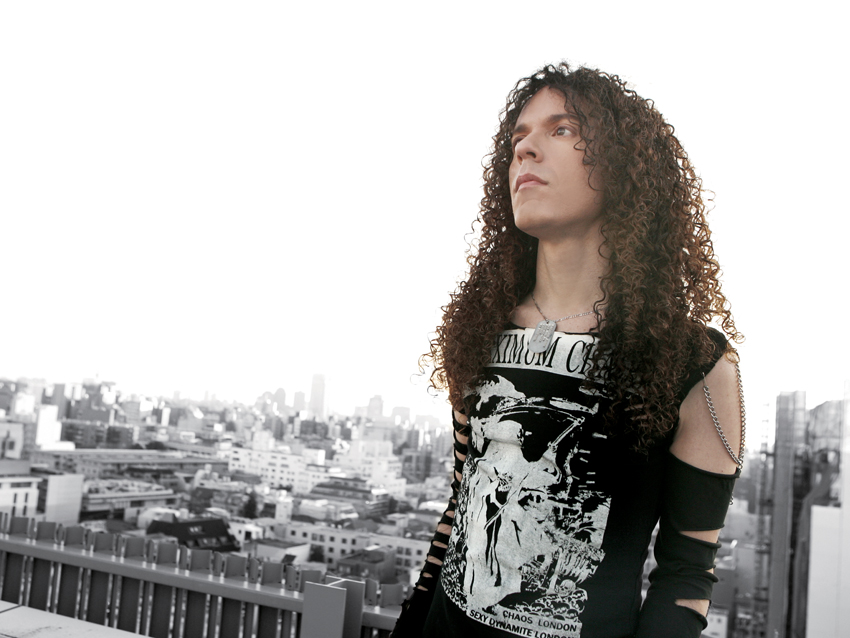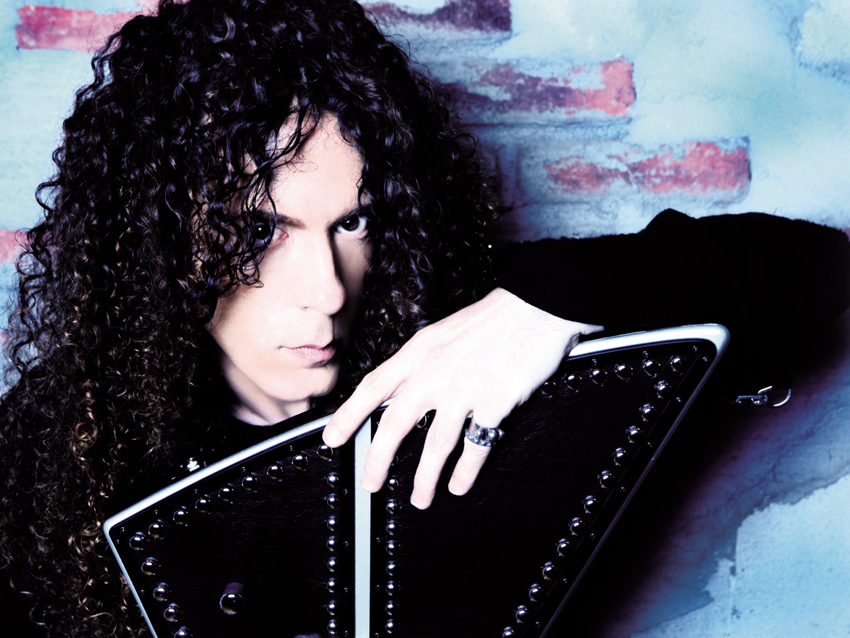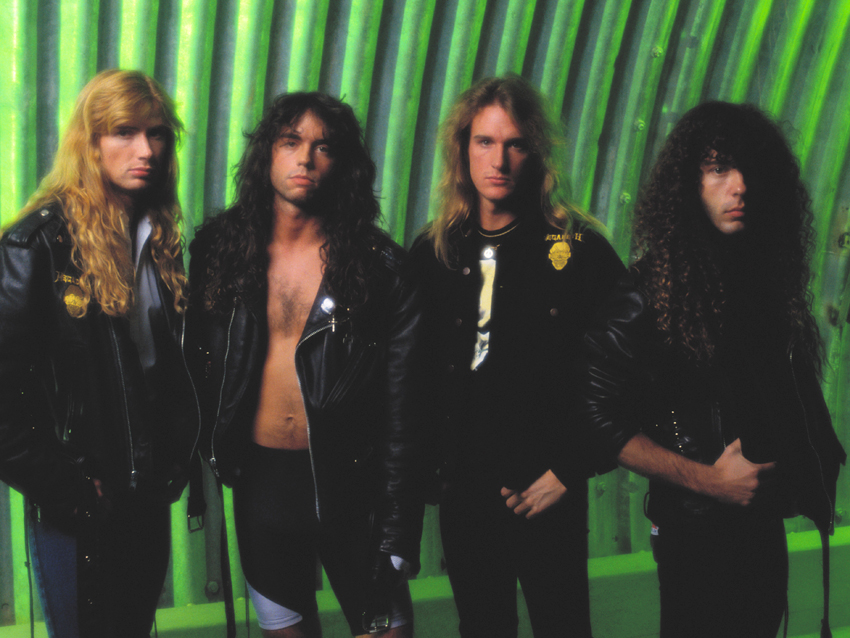
Marty Friedman: "The term 'virtuoso shredder' makes me cringe"
Millions of TV viewers in Japan know guitarist Marty Friedman for his hosting appearances on shows such as Rock Fujiyama and Hebimstasan – the latter of which translates to "Mr. Heavy Metal." But Friedman laughs at the suggestion that he's any kind of walking authority on the genre.
"That's just the name of the show, or at least that's the English translation of the title," he says. "Maybe people think that’s what I am, but it’s not the case. I would never think for a second that I was an expert on all things metal. God, no!”
You wouldn't know it from his past work – his furious guitar playing along with former partner Jason Becker in the '80s instrumental axe duo Cacophony, or certainly his 10-year stint trading head-spinning licks with Dave Mustaine in the thrash metal band Megadeth. And you certainly couldn't tell from one listen to his upcoming album Inferno, a wide-ranging musical affair that doesn't skimp on the metallic goodness. The record – Friedman's first worldwide since he relocated to Japan some 15 years ago – features guests spots by Rodrigo & Gabriela, Alexi Leiho of Children of Bodom, Revocation's David Davidson and, significantly, a songwriting collaboration between Becker and Friedman (it's the first time they've worked together since their Cacophony days).
Friedman sat down with MusicRadar recently to talk about Inferno, his successful career in Japan, how he and Becker worked together on their track Horrors (Jason suffers from ALS) and what he feels about being called a "shred virtuoso" (spoiler alert: He's not crazy about it).
I’m curious – what led to your decision to relocate to Japan in the first place?
“It really stemmed from the fact that I was listening to Japanese music 100 percent of the time. I had lost all interest in the music from America and England. I had become infatuated with the wide variety of popular music in Japan, everything from full-on deep metal to full-on sugary pop. I just thought that I could do so much more if I was in the Japanese music scene. I felt like a logical decision to go where the music was happening.”
It worked out, obviously, but at the time did it feel like something of a risky gambit?
“Yeah, I knew it was a daunting task and probably not the smartest thing to do at the time, but as an artist I know that all you can do is believe in yourself. What I wanted to do was happening in Japan, so that’s where I went. It sounds corny, but you have to follow your dreams.
“You’ve gotta be where you can do the most damage and where you can reach your potential. If you’re a French chef, you don’t want to be living in Indonesia. In many ways, it was like starting from scratch, but it turned out to be the best thing I’ve ever done. The whole thing totally exceeded anything I could have imagined, musically and personally.”
Inferno is your first American release, but how is if different from the solo albums you’ve put out in Japan?
“Well, one of the things that having a TV career in Japan has allowed me to do is put out solo albums without a single consideration for who the end user is. I can cater to every one of my whims, and the only person I have to worry about pleasing is myself. If you wanna come to the party, that’s great.
“Inferno is a worldwide release, and the company that put the whole thing together is American. I gathered a lot of thoughts from people all over the world as to what they wanted from me. What came back was, people wanted me to play my ass off and be aggressive, and they wanted it to be metal.”

Modern-day recording
Well, you are Mr. Heavy Metal.
[Laughs] “Yeah, right. I forgot. So I took those thoughts into consideration, but I also thought that I wasn’t going to look back to what I’d done and try to re-create where I’d been before. I wanted to satisfy people’s wishes, but at the same time I knew I had to go somewhere new and do something I’d never done before. I think I brought all of those schools of thought together on the record. I kept my fans in mind, I thought about possible new fans, and I certainly made sure to please myself, too.”
What was the process of recording the album? Did you do it in your home studio?
“I did all my demos in my home studio, but I went to other studios to do the real tracking. The majority of the recording was done in LA. It was a real American vibe: I was surrounded by American people, which felt fresh for me, and I spoke English the whole time. That was very unusual, by the way – I pretty much speak Japanese all the time now.”
You’ve got some pretty cool guests on the record. Did everybody record with you live in the studio, or did some people send you their parts?
“We did it every possible way. Some people were with me in the same room; other people were working in other studios. We did this great thing where you can actually link studios together, kind of like Skype but with real-time, high-quality audio. You can virtually be in any studio in the world from anywhere, so that’s pretty cool. It’s no different from what people do when they’re in bands together. I even mixed the record that way: It was mixed in Sweden, but I was in LA. It’s a little like living a double life.”

On shred guitar music
How was it to work with Jason Becker? Sadly, because of his illness, he can't play guitar anymore.
“The main consideration was that what Jason wrote for Horrors was acoustic based. Just like I did when we were in Cacophony together, I took what he had, which was more of a traditional classical thing, and I played something way more abstract to counterpoint it. Being that Jason can’t play guitar, I thought, ‘Wow, I’ve got to play his stuff myself... Fuck that!’ [Laughs] So I contacted this wonderful guitarist named Ewan Dobson from Canada, who’s like this YouTube sensation, and I basically asked him, ‘How would you like to be Jason Becker on this song?’
“I gave him Jason’s acoustic parts along with my acoustic parts, and he was able to play them in literally half the time if would have taken me to do them – he’s such an acoustic master. It came out great. It’s almost as if Jason’s spirit is in the room.
“Unlike Cacophony, I played all the electric stuff myself, and that was cool. It wasn’t any more challenging than anything else I did on the record. The whole vibe was really, ‘Here’s the Marty and Jason that you wished would have continued if he hadn’t have gotten sick.’ This is what we would sound like in 2014 if we had been able to keep playing together and evolving.”
When you and Jason came out in Cacophony, it was during the height of the shred era. In retrospect, do any aspects of that scene feel a little over the top? The pointy guitars, the hair, the focus on speed licks and tricks?
“Well, I’m a big fan of pointy guitars and hair. [Laughs] But I’ll bring Jason into this and speak for him at the same time. I don’t think there was anybody else in that scene that we really cared for at all. We respected everybody’s abilities, but as insane as the core of that scene was, the idea for us was to create wonderful music that was based on melody and emotion. When we heard all of these other guitarists who were put into the shred genre, we thought it was wanking of the highest order.
“We’d rag on a lot of that stuff. We called it ‘NAMM show music.’ It was the same kind of pseudo-progressive drum beats – no cajones, no balls. There were no crying melodies to that stuff. It was lots of chops but little else. Jason and I didn’t like the term ‘shred.’ We didn’t like being lumped in with those guys, even if some of them were selling more records than us. We didn’t want to be associated with the scene then, and we still don’t.
“I had to get over it and just get on with what I was doing. The term ‘virtuoso shredder’ makes me cringe. I see myself described like that – ‘Marty Friedman, virtuoso shredder' – and it's like, 'Why?' Those just aren’t words that I like. Whoever bought a record because somebody was a virtuoso or a shredder, you know? But some guitar players, they hear the word ‘shredder’ and they just get a hard-on for it.
“Guitar magazines and advertising companies go crazy over that word – 'shredder.' It gives them something to sell; they can sell it to young amateurs. Anybody who sticks with music for a long time won’t pay attention to that stuff – it goes right past them. But the money is made with the beginners, and those people respond to words like ‘shred’ or ‘virtuoso.’ It’s just the way it goes.”

On Megadeth
Photo: With Megadeth in 1990: (from left) Dave Mustaine, Nick Menza, David Ellefson and Friedman.
You had a nice long run in Megadeth. Is there anything you miss about being in that band?
“I loved everything about it. I loved the guys, the music, the fans. I loved the way we ran it – it was a great machine. It was what it was, and it was fantastic. I take great pride in what we did together. But I can’t really say that I miss anything about it at all. Well, I do miss hanging out with the guys. We’re still friends, I assume. We’re in touch sometimes. You know, when you’re in a band with that kind of activity, you’re up each other’s asses 24 hours a day. [Laughs] In some ways, it’s tighter than a family. But I wouldn’t trade my experiences since then for anything. I wouldn’t do back there in a million years.”
Which might answer my next question: Would you entertain an offer to join another big band?
“Oh, I definitely would do that in a heartbeat. I would love to be in a great, great fresh and exciting band. You can make a point out of this: I do exactly what I want to do, but if I had an offer from a great band that was exciting and challenging and that I could contribute to, I’d be in there, absolutely. I’m really open to anything. When I’m totally into something, that’s when I do my best work. If I’m bored with something, I tend to try to do other things. I’m up for anything that would be a cool musical endeavor.”
When Jason became ill and had to bow out of the David Lee Roth band, if David’s camp reached out to you, would you have considered that offer, or would you not have wanted to go there?
“Luckily, I never would’ve had to make that decision because there were a lot of guys who were better suited for that gig than me. For one thing, I’ve never done a fret-tapping thing in my life. [Laughs] Not once. Most of those Van Halen songs would’ve proven to be quite challenging for me.
“Had they have come begging for me to do the gig, and if Jason had asked me to do it, I might have learned how to fret tap and maybe I would have entertained the idea of doing it. But that was never my cup of tea in the first place. I was a great fan of Van Halen and David Lee Roth, but that was never anything I felt I had to do in my guitar playing.”
Marty Friedman's album Inferno will be released on May 27. You can pre-order it at Prosthetic Records.
Joe is a freelance journalist who has, over the past few decades, interviewed hundreds of guitarists for Guitar World, Guitar Player, MusicRadar and Classic Rock. He is also a former editor of Guitar World, contributing writer for Guitar Aficionado and VP of A&R for Island Records. He’s an enthusiastic guitarist, but he’s nowhere near the likes of the people he interviews. Surprisingly, his skills are more suited to the drums. If you need a drummer for your Beatles tribute band, look him up.
